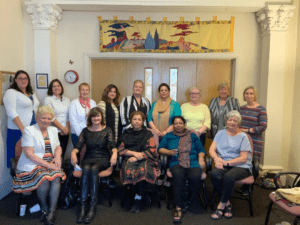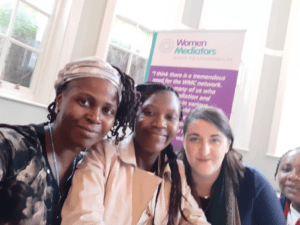Removing Borders. Member Spotlight: Bebhinn McKinley
Bebhinn is a dialogue, conflict prevention/transformation, and peacebuilding practitioner based in County Antrim, Northern Ireland, where she works for local government, having previously worked for Central Government and a number of NGOs. She possesses a Bachelor’s Degree in English & Politics, as well as a Master’s Degree in Irish Studies and an MSc in Sustainable Rural Development, all from Queen’s University Belfast. Apart from administrative and operational functions, she works on promoting good relations with people of different political and religious views, as well as representants of different ethnicities. She is a member of Women Mediators Across the Commonwealth, through which she has recently delivered a Strategic Mediation Fund program in partnership with Training Women’s Network for women in Northern Ireland and contributed to the Global Alliance panel discussions to mark UNSCR1325 Bebhinn was also involved in the project Women’s Voices, Building Networks: Voices of women in peace mediation on the island of Ireland. She is passionate and determined to ensure that women’s voices, skills, knowledge, and capacity within conflict transformation and peace processes are heard and valued at all levels.
Inspired to remove the walls
 When talking about her inspiration, Bebhinn recalls the memories from early childhood. She was born on the southern part of the border between Ireland and Northern Ireland, and before moving to the north (Northern Ireland) – where her family came from – lived there for around 6 years. “At that time there was significant conflict and violence in Northern Ireland, many families moved, for safety reasons to the southern part of Ireland. I remember even as a child, traveling over the border, which was considerably militarized, was always both fascinating and unnerving for me. In the international context, often borders exist, and where there is no conflict, and in such contexts, they simply act to mark jurisdictional boundaries or movement of goods, etc. However, when they are present in societies in conflict, where violence is a present, daily occurrence, they are often the place where the conflict manifests itself most visibly. Such is the case within Ireland I believe.”
When talking about her inspiration, Bebhinn recalls the memories from early childhood. She was born on the southern part of the border between Ireland and Northern Ireland, and before moving to the north (Northern Ireland) – where her family came from – lived there for around 6 years. “At that time there was significant conflict and violence in Northern Ireland, many families moved, for safety reasons to the southern part of Ireland. I remember even as a child, traveling over the border, which was considerably militarized, was always both fascinating and unnerving for me. In the international context, often borders exist, and where there is no conflict, and in such contexts, they simply act to mark jurisdictional boundaries or movement of goods, etc. However, when they are present in societies in conflict, where violence is a present, daily occurrence, they are often the place where the conflict manifests itself most visibly. Such is the case within Ireland I believe.”
Bebhinn says and draws attention to our perception of borders. Having borders may give us a sense of belonging or “identity” whatever that may mean to some, but when it causes violence and conflict, that can only serve to separate people. In such cases, the border(s) not only exist in a physical manner and affect day-to-day mobility or access to services but perhaps even more so at the psychological level, even long after the violence has ceased. And so, memory and the psychology of borders is an important factor in resolving conflict in such contexts and building sustainable peace.
A Sense of Relief
 “One of my key memories is from 1994 when the ceasefire was declared. I remember being at my grandparents’ house and watching television when the program was interrupted, and breaking news was reported. When I found out that IRA declared a ceasefire, I remember the experience of relief, and importantly hope, that maybe we can find a way to peace. That was what struck me and shaped me, the relief and even the prospect of peace can bring.” Bebhinn also refers to the story of her mother, who in 1994 became involved in a women’s organization, and was involved in dialogues with women in different backgrounds. Even though just 12 years old, Bebhinn had an opportunity to witness and take part in dialogue sessions and noticed that all these women regardless of where they came from, what political or religious background they represented, all suffered equally as a result of the conflict. Another thing that all of them had in common was the fact of being very future-focused, they wanted something better for their children. And this future-focused approach is a core aspect of what she brings into her current work on mediation, good relations, and peacebuilding.
“One of my key memories is from 1994 when the ceasefire was declared. I remember being at my grandparents’ house and watching television when the program was interrupted, and breaking news was reported. When I found out that IRA declared a ceasefire, I remember the experience of relief, and importantly hope, that maybe we can find a way to peace. That was what struck me and shaped me, the relief and even the prospect of peace can bring.” Bebhinn also refers to the story of her mother, who in 1994 became involved in a women’s organization, and was involved in dialogues with women in different backgrounds. Even though just 12 years old, Bebhinn had an opportunity to witness and take part in dialogue sessions and noticed that all these women regardless of where they came from, what political or religious background they represented, all suffered equally as a result of the conflict. Another thing that all of them had in common was the fact of being very future-focused, they wanted something better for their children. And this future-focused approach is a core aspect of what she brings into her current work on mediation, good relations, and peacebuilding.
Bebhinn was inspired to volunteer for the community groups and organizations and was a board member of Community Dialogue and got interested in politics, conflict prevention and transformation, peacebuilding, dialogue, and sustainable development. It resulted in her working for different organizations such as Women into Politics, Rural Community Network, and Community Relations Council, where, as a policy officer she was looking at aspects connected with transitional justice, ex-combatants, ex-prisoners, legacy issues, physical segregation, peace/ interface walls, demarcation of space, contentious cultural demonstrations, as well as memorialization and remembering. “Along with others, a large focus of her work was on physical lines of division, supporting attempts to deescalate the tensions when they arose. And to also create the conditions to allow people to envision the transformation and removal not only of those physical walls but those in people’s minds. That is what I am passionate about” she adds. Bebhinn was also seconded to the NI Government Executive Office, to support aspects around drafting, policy development, and the implementation of the Together: Building a United Community Strategy.
Growing as a mediator
 Bebhinn is currently accredited by both Mediators Institute Ireland and International Mediation Institute. She a Northern Ireland representative of Women Mediators Across the Commonwealth, and through the organization, she learned about the MBBI, and is a member of the MBBI Europe Regional Group. She immediately recognized it as an opportunity to connect with other mediators, to learn about different contexts, and what is going on in different contexts. “It is an opportunity to support, and learn from each other. If you are involved in something, everything you learn, you should be always seeking to pass on” and this is what MBBI helps with. What Bebhinn learns, she utilizes in her work for local government that covers all aspects of mediation, conflict prevention, cultural diversity, and peacebuilding. It might not be mediation in a traditional sense, but she is trying to bring a mediator’s approach into everything and create a dialogue and understanding. The project that she is working on right now is looking at the contested cultural expression and identity through exploring shared heritage and traditions. Bebhinn is also involved in coaching and training, and is currently an associate with Mediation Foundation Ireland and recently got involved in developing a course on the Mediative Approach for Human Resources and Business Leaders for the British Chamber of Commerce in Kosovo, that introduces participants to the successful strategies of managing relationships and resolving disputes in ways that add to the bottom line of the business. She is due to contribute to a panel discussion in June on creative approaches to dialogue and mediation at the ADR British Colombia symposium.
Bebhinn is currently accredited by both Mediators Institute Ireland and International Mediation Institute. She a Northern Ireland representative of Women Mediators Across the Commonwealth, and through the organization, she learned about the MBBI, and is a member of the MBBI Europe Regional Group. She immediately recognized it as an opportunity to connect with other mediators, to learn about different contexts, and what is going on in different contexts. “It is an opportunity to support, and learn from each other. If you are involved in something, everything you learn, you should be always seeking to pass on” and this is what MBBI helps with. What Bebhinn learns, she utilizes in her work for local government that covers all aspects of mediation, conflict prevention, cultural diversity, and peacebuilding. It might not be mediation in a traditional sense, but she is trying to bring a mediator’s approach into everything and create a dialogue and understanding. The project that she is working on right now is looking at the contested cultural expression and identity through exploring shared heritage and traditions. Bebhinn is also involved in coaching and training, and is currently an associate with Mediation Foundation Ireland and recently got involved in developing a course on the Mediative Approach for Human Resources and Business Leaders for the British Chamber of Commerce in Kosovo, that introduces participants to the successful strategies of managing relationships and resolving disputes in ways that add to the bottom line of the business. She is due to contribute to a panel discussion in June on creative approaches to dialogue and mediation at the ADR British Colombia symposium.
Gaining different perspective
“Sometimes we do not realize the importance of our sense of culture or identity until we feel that is being taken away. I come from the perspective of saying it is vital to expose yourself and allow yourself to be exposed to different things and different cultures and ideas, but in some cases, our differences although something which should be seen as a strength is viewed as a negative thing, and there is a belief that we need to protect our culture or our identity at the exclusion of others, which can only be at the detriment to wider society.” According to Bebhinn, the concept of “my culture” is something that we have to move away from, and accept that our cultures as always changing and shifting, there is a historical heritage or context that will always be present, but culture is not a monolith. In terms of mediation, often the language barrier is also there, even in terms of the terminology used in different contexts, which is why cross-cultural communication learning is so valuable “Sometimes there are things that we overlook due to over-familiarity, and finally when you get out of your comfort zone, you have the opportunity to learn and gain a new or different perspective.”
Article by Maciej Witek, MBBI Writer
